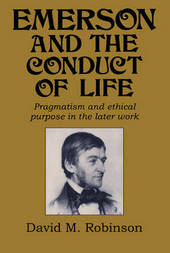
|
Emerson and the Conduct of Life: Pragmatism and Ethical Purpose in the Later Work
Paperback / softback
Main Details
Description
'I like not the man who is thinking how to be good,' Ralph Waldo Emerson wrote, 'but the man thinking how to accomplish his work'. The ethical emphasis on work and activity signals the shift in his thinking that is the subject of Emerson and the Conduct of Life. In this book, David M. Robinson describes Emerson's evolution from mystic to pragmatist and shows the importance of Emerson's undervalued later writing. Emerson's reputation has rested on the addresses and essays of the 1830s and 1840s, in which he propounded a version of transcendental idealism and memorably portrayed moments of mystical insight. But Emerson's later thinking suggests an increasing concern over the elusiveness of mysticism and an increasing emphasis on ethical choice and practical power. Robinson discusses each of Emerson's major later works noting their increasing orientation to a philosophy of the 'conduct of life'. These books represent Emerson's attempt to forge a philosophy based on the centrality of domestic life, vocation and social relations and they reveal Emerson as an ethical philosopher who stressed the spiritual value of human relations, work and social action.
Reviews"[a] mature, well reasoned, and readable study...Robinson expertly and in a pleasantly unemphatic way contextualizes Emerson's later essays and lectures within both Emerson's own biography and the social and economic realities of nineteenth-century American and British life...David M. Robinson's well-written, carefully researched, and sincerely argued presentation of Emerson's pragmatism and ethical purpose in the second half of the nineteenth century serves also to point to a sensibility that, I think, is much needed now." Gertrude Reif Hughes, Nineteenth Century Literature "...David Robinson has established himself as one of our subtlest and most deeply sympathetic readers of Emerson...Emerson and the Conduct of Life...will become standard reading." Kenneth Dauber, American Literature "...[a] mature, well reasoned, and readable study...David M. Robinson's well-written, carefull researched, and sincerely argued presentation of Emerson's pragmatism and ethical purpose n the second half of the nineteenth century serves also to point to a sensibity that, I think, is much needed now." Gertrude Reif Hughes, Wesleyan University, Nineteenth-Century Literature "His sensitive readings of individual and pairs of essays, and his refreshing attention to mood and range of works provide illuminating insight into the compelling and contradictory writings of the later Emerson." Jane Goldman, Journal of American Studies "In a series of wonderfully penetrating and innovative close readings Robinson explores the 'pragmatic turn' in Emerson's oeuvre...Robinson makes us aware of a deepening commitment to social ethics in Emerson from the early essays through the late works...Emerson and the Conduct of Life, for this reader and for all its specific emphasis, belongs with the select company of indispensable work on Emerson." Herwig Friedl, ZAA
|